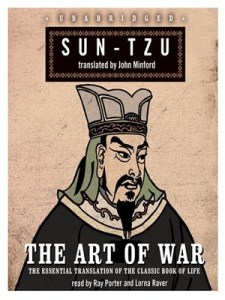Title: The Art of War: The Essential Translation of the Classic Book of Life
Author: Sun Tzu (original text) and John Minford (translator/commentator)
Genre: Classic/History
Trigger Warnings: Discussion of war, death, and violence
Back Cover:
For more than two thousand years, The Art of War has stood as a cornerstone of Chinese culture, a lucid text that reveals as much about psychology, politics, and economics as it does about battlefield strategy. The influence of Sun-tzu’s text has grown tremendously in the West in recent years, with military leaders, politicians, and corporate executives alike finding valuable insight in these ancient words.
Review:
I hadn’t really intended to review this book, because I didn’t really have a lot to say about it. Then I encountered this Tumblr post that was so on the nose that I had to write a review just so I could show how somebody else’s words said my thoughts better:

This version of the book has a lot of context and commentary on it, which is good because just the text of Sun Tzu’s book is maybe ten pages. I also think it’s good to read a version with context and commentary, because you get an understanding of what was going on in the world when Sun Tzu (or his disciples or someone writing under that pseudonym) was writing, the historical stories and legends discussed, and its influence on Chinese thought. It also included ancient Chinese commentary as well as the translator’s commentary, and occasionally the translator’s commentary on the ancient Chinese commentary to explain concepts or historical or mythological figures discussed.
All of this is good information to support Sun Tzu’s actual text, which really does read like the Tumblr post. It feels like sitting down and studying the book would lead to good strategic warfare, but at the same time most of the advice presented seems very common-sense – the “if you think you might lose, avoid doing that” kind. But if nothing else, it was an interesting read, especially with all the commentary included.

